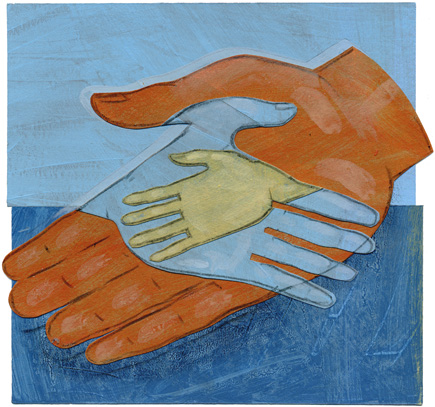Gandhi and the Virtue of Forgiveness
by Alan Hunter and Andrew Rigby

“Forgiveness” art by Leigh Wells; courtesy greatergood.berkeley.edu
Abstract: Satyagraha and ahimsa are widely acknowledged as central to Gandhi’s life-work. Our argument in this paper is that forgiveness (ksama in Sanskrit) was another of Gandhi’s core values. The first section of the paper introduces ways in which forgiveness has been understood as a concept and practice within Western traditions. We demonstrate that forgiveness lies close to the heart of Christianity, and show that it is also an issue relevant to contemporary concerns: since the 1990s forgiveness has featured in numerous secular studies, exhibitions, websites, and other media. The second section identifies how the key precepts that informed Gandhi’s vision of the transformatory significance of forgiveness were derived from and grounded in the spiritual and philosophical traditions of South Asia, Hinduism and especially Jainism. Our final section more specifically explores the implications of forgiveness in Gandhi’s thought and practice. Forgiveness is an important component of Gandhi’s dual concerns: the ‘spiritualisation of politics’, and also the ‘politicisation of spirituality’.
Introduction: Satyagraha and ahimsa are widely acknowledged as central to Gandhi’s life-work. Our argument in this paper is that forgiveness (ksama in Sanskrit) was also one of Gandhi’s core values, and one that has been overlooked in most scholarship. In this paper we explore the significance ascribed to forgiveness in South Asian religions, and identify the manner in which South Asian perspectives on forgiveness shed light on Gandhi’s conceptualization of personal and political transformation. However, although Gandhi considered himself a Hindu, he was certainly richly eclectic in the sources of his religious and philosophical convictions. Theosophy, Tolstoy and Ruskin, esoteric Christianity, and Indian nationalism were all important formative influences. We, therefore, contextualise our discussion of forgiveness within Western as well as South Asian traditions of thought and practice.
Read the pdf of the complete article here: Gandhi and the Virtue of Forgiveness
EDITOR’S NOTE: Alan Hunter is Professor of Asian Studies at Coventry University (UK), where he is Director of the Centre for Peace and Reconciliation Studies. During the past twenty years his main research areas have encompassed religion in contemporary China, modern Chinese culture and politics, Indian Studies, including the reception of Indian thought in China, and Peace and Human Security Studies. His recent publications include Peace Studies in the Chinese Century, London: Ashgate, 2006; ‘Life and Work of Swami Vivekananda’ [in Chinese] Edited texts and 3 original chapters, translated into Chinese by Wang Zhicheng, Zhejiang: Zhejiang University Press, 2006; and, Alan Hunter, ‘Swami Vivekananda in China’, Vedanta Kesari, October 2007, pp. 378-83.
Andrew Rigby is Emeritus Professor of Peace Studies, Coventry University and was for many years a Reader in Peace Studies at the Bradford University School of Peace Studies before leaving to become the founding director of the Centre for Peace and Reconciliation Studies at Coventry University. Andrew was drawn to Peace Studies because of his pacifist convictions, which in turn led to his long association with the British pacifist publication Peace News and with War Resisters’ International. He has published on such topics as alternative nonviolent life styles, the Gandhian sarvodaya movement in India, the role of forgiveness in nonviolent conflict transformation, biographies of pacifists and philosophers with particular insights into the dynamics of nonviolent change, dealing with the past in societies emerging out of damaging violent conflict, maritime-based nonviolent direct action, and the emotional dynamics of peace-building and conflict transformation. His study of the first Palestinian intifada has been re-published in a fully revised edition as The First Palestinian Intifada Revisited, Sparsnäs (Sweden): Irene Publications, 2015. His most recent book (co-authored with Marwan Darweish) is, Popular Protest in Palestine: The Uncertain Future of Unarmed Resistance, London: Pluto Press, 2015. This article has been shared with mkgandhi.org and Gandhi Marg (Volume 30, #4, January-March 2009) under a Creative Commons Attribution 4.0 International License.




